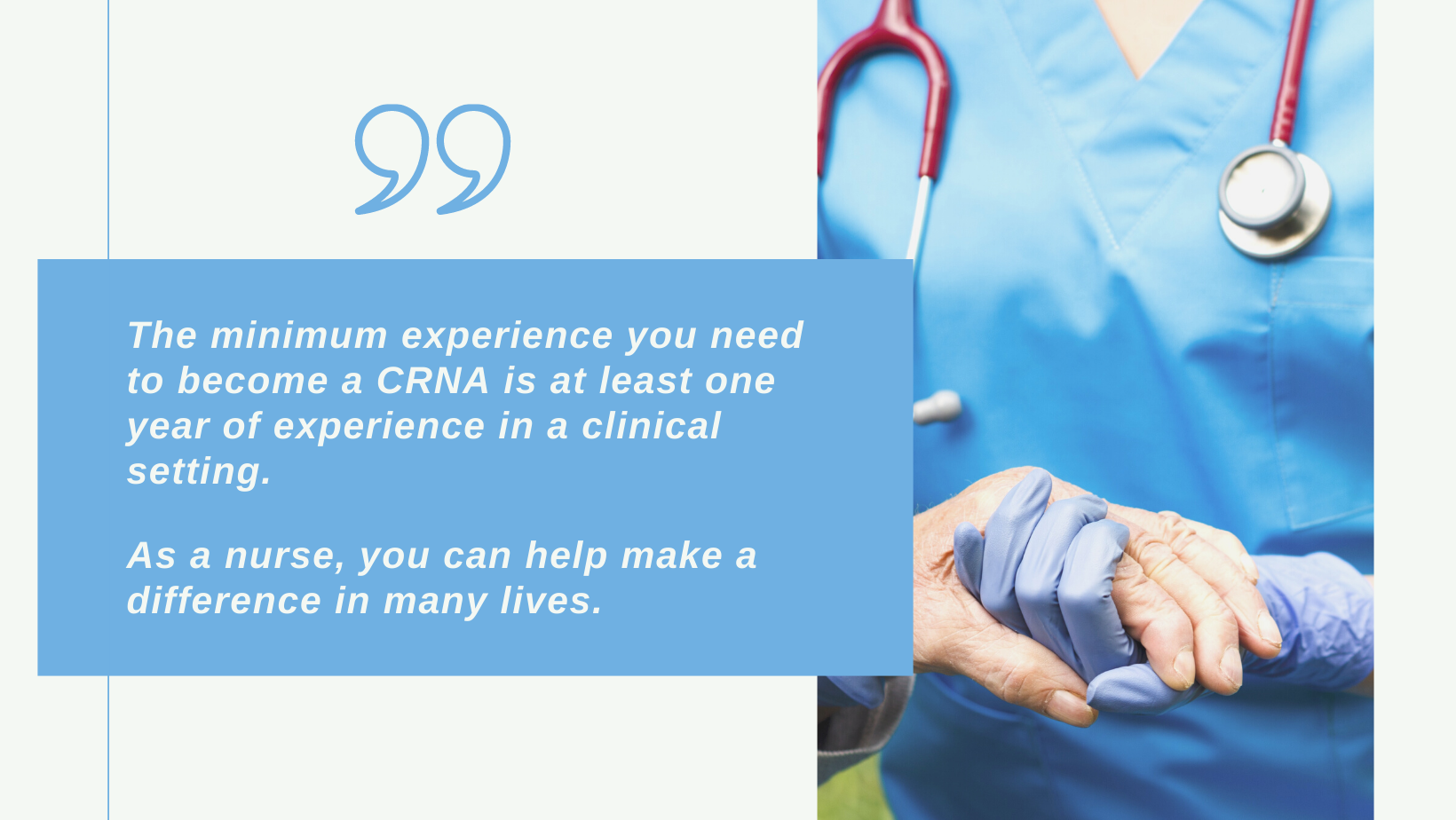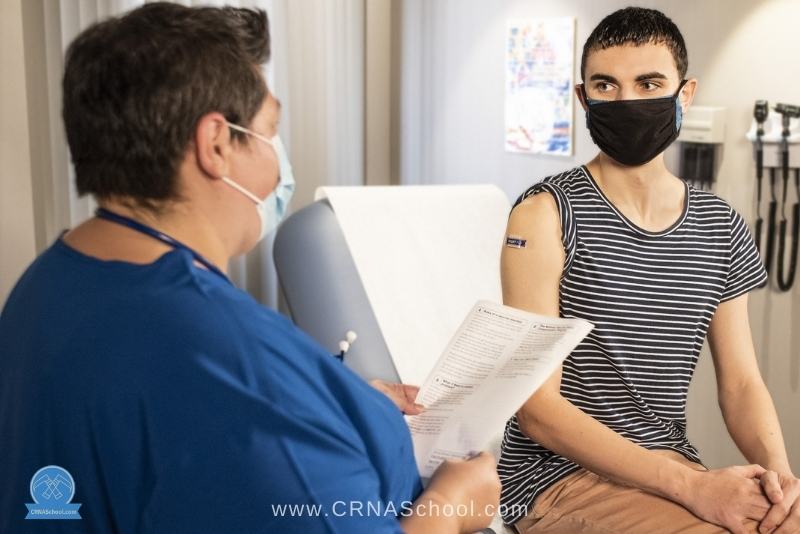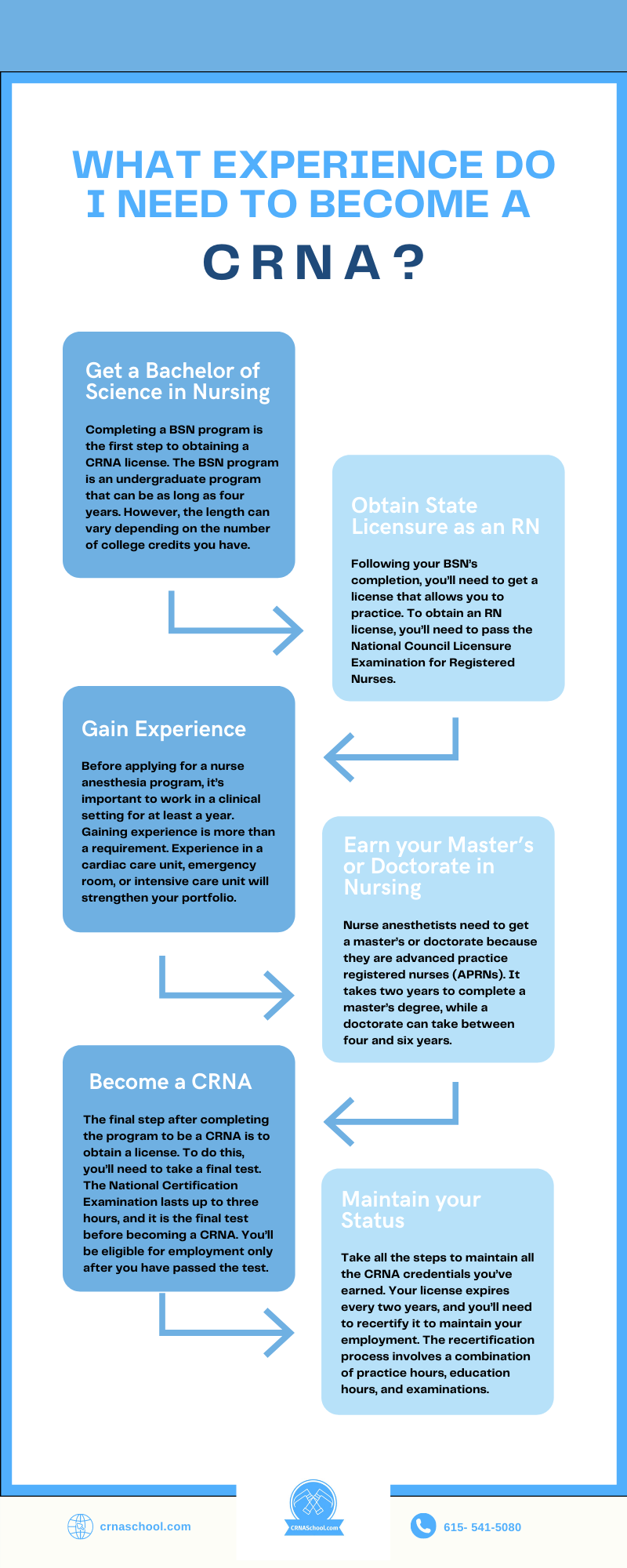A CRNA represents one of the most advanced specialties in nursing. For this reason, nurse anesthetists continue to be in demand and many nurses seek to advance their career by becoming a CRNA.
The minimum experience you need to become a CRNA is at least one year of experience in a clinical setting. Hours of work in critical care areas such as cardiac care units, emergency rooms, or intensive care units are usually required before being accepted into the CRNA program.
The nursing career is one of the most rewarding careers available. Are you considering a nursing career or advancing your nursing career? Read on.
What is a CRNA?
A CRNA is a registered nurse who administers anesthetics to patients, provides post-surgical care, and monitors their vital signs. CRNAs work in emergency rooms, clinics, outpatient settings, and intensive care units of hospitals.
As a CRNA, you’ll need these skills:
- Interpersonal communication
- Teamwork
- Verbal and written communication
- Emotional intelligence
- Stamina
- Organization
- Time management

What does a CRNA do?
A CRNA provides critical care through the safe delivery of anesthetics to patients in need of pain management. CRNAs oversee the anesthesia process, monitor vital signs throughout the surgical procedure, and provide specialized care after a surgical procedure. A CRNAs’ daily routine also involves:
- Requesting diagnostic studies
- Educating patients about side effects and risks
- Creating anesthetic plans
- Examining patient’s medical history.
- Administrative duties like managing finances and training staff.
What are the Steps to Become a CRNA
Earning a CRNA involves several years of schooling. Here are the steps to become a CRNA:
1. Get a Bachelor of Science in Nursing
Completing a BSN program is the first step to obtaining a CRNA license. The BSN program is an undergraduate program that can be as long as four years. However, the length can vary depending on the number of college credits you have.
The accelerated BSN program is designed for bachelor’s degree holders in unrelated fields. With the accelerated BSN program, you can earn your BSN within 11 months. Maintaining an average grade point of 3.0 is important, especially if you want to later earn a master’s degree.

2. Obtain State Licensure as an RN
Following your BSN’s completion, you’ll need to get a license that allows you to practice. To obtain an RN license, you’ll need to pass the National Council Licensure Examination for Registered Nurses.
The License requirement is different for each state. Therefore, you’ll need to carry out extensive research if you want to move to a different state later on.
3. Gain Experience
Before applying for a nurse anesthesia program, it’s important to work in a clinical setting for at least a year. Gaining experience is more than a requirement. Experience in a cardiac care unit, emergency room, or intensive care unit will strengthen your portfolio.
Earning a Critical Care Registered Nurse Certification can help you get accepted into the CRNA program. Some programs will require you to complete hours of work in critical care situations before you can earn the certification.

4. Earn your Master’s or Doctorate in Nursing
Nurse anesthetists need to get a master’s or doctorate because they are advanced practice registered nurses (APRNs). It takes two years to complete a master’s degree, while a doctorate can take between four and six years.
With a master’s degree, you can enter the workforce sooner than you would if you were working on a Ph.D. . However, the Ph.D. will increase your chances of achieving a higher position. Here are some of the requirements you’ll need, irrespective of the program you choose:
- College transcripts
- BSN degree
- Minimum of two years working experience as an RN
- Proof of a valid RN license
- 3.0 GPA in college
- Specialized certifications
- Experience shadowing a CRNA anesthesiologist
- Background check
- Goal statement or personal essay
- One year of experience working in the intensive care unit.
One of the most important things to do is to research the requirements of your school of choice. You must ensure that the school is accredited.

5. Become a CRNA
The final step after completing the program to be a CRNA is to obtain a license. To do this, you’ll need to take a final test. The National Certification Examination lasts up to three hours, and it is the final test before becoming a CRNA. You’ll be eligible for employment only after you have passed the test.

6. Maintain your Status
Take all the steps to maintain all the CRNA credentials you’ve earned. Your license expires every two years, and you’ll need to recertify it to maintain your employment. The recertification process involves a combination of practice hours, education hours, and examinations. CRNAs will need to recertify their CRNA certification and their state-level APRN.
Is a CRNA Degree Right for Me?
The CRNA program won’t be a great choice for you if you like an easy and predictable job. The CRNA course is demanding and rigorous. Once you’ve become a CRNA, you’ll find yourself in cases that require critical thinking.
As a CRNA, you’ll need a high level of preparedness and responsibility. The job can be exciting, and it’s filled with many interesting moments. A CRNA role will be right for you if you are looking for a highly-respected and highly-compensated job.
Frequently Asked Questions
There are so many questions surrounding the CRNA career because of the nature of the professional education and employment involved.
Here are some frequently asked questions:
- How long is a CRNA education program? The CRNA program takes up to 36 months to complete. It includes clinical and classroom experience work. The curriculum includes physiology, chemistry, pharmacology, physics, pathophysiology, anatomy, and biochemistry.
- Where do CRNAs work? Most CRNAs work in medical settings like ambulatory surgery centers, traditional hospitals, pain clinics, and doctor’s offices. Some work in the private sector, while others in the public sector. You’ll find many CRNAs working as independent contractors for hospitals and physicians.
- How does a nurse become a CRNA? As a nurse with a BSN and an RN license, you can apply for the CRNA program. Once you graduate, you’ll need to pass the National Certification Examination to become a CRNA.

